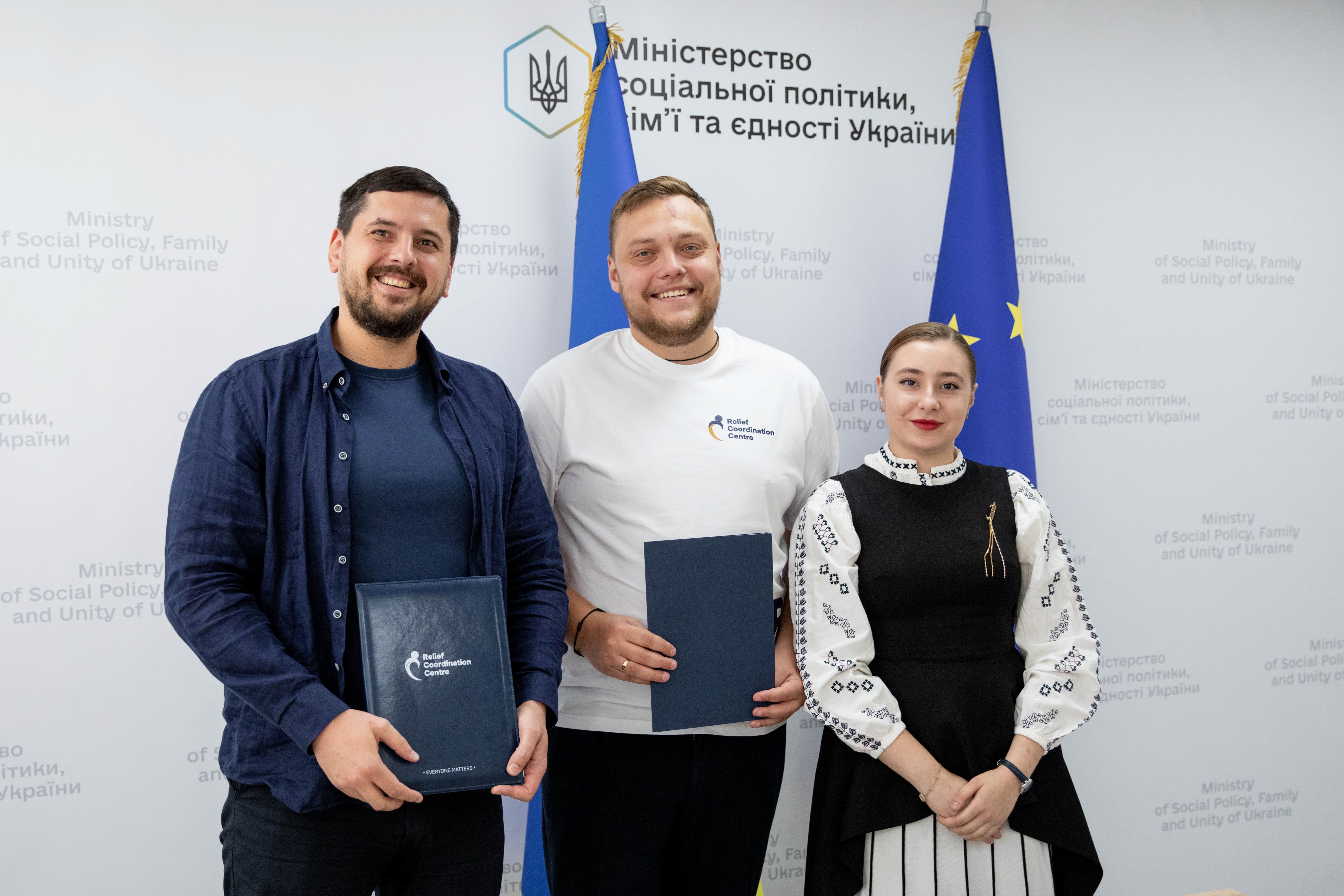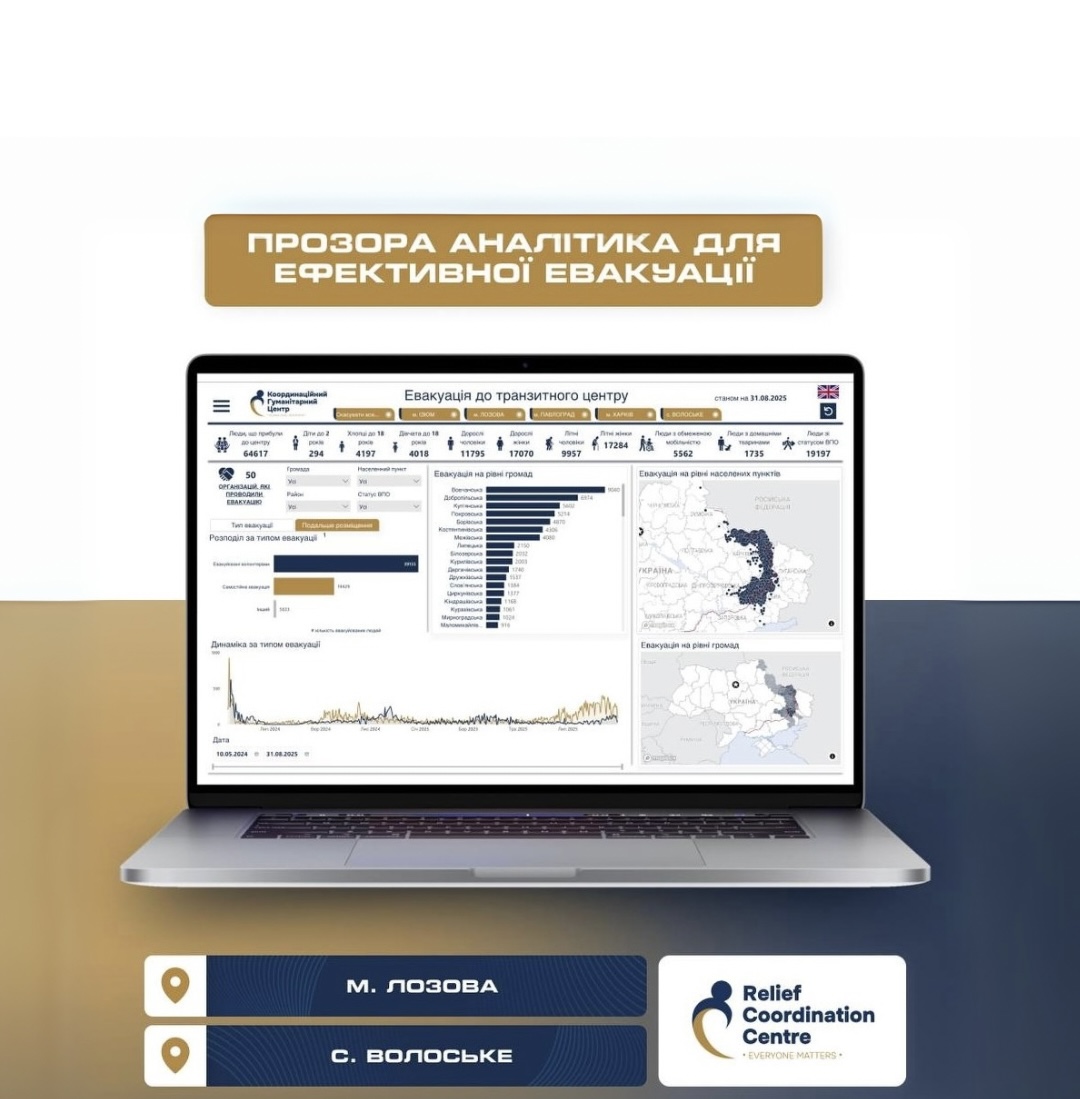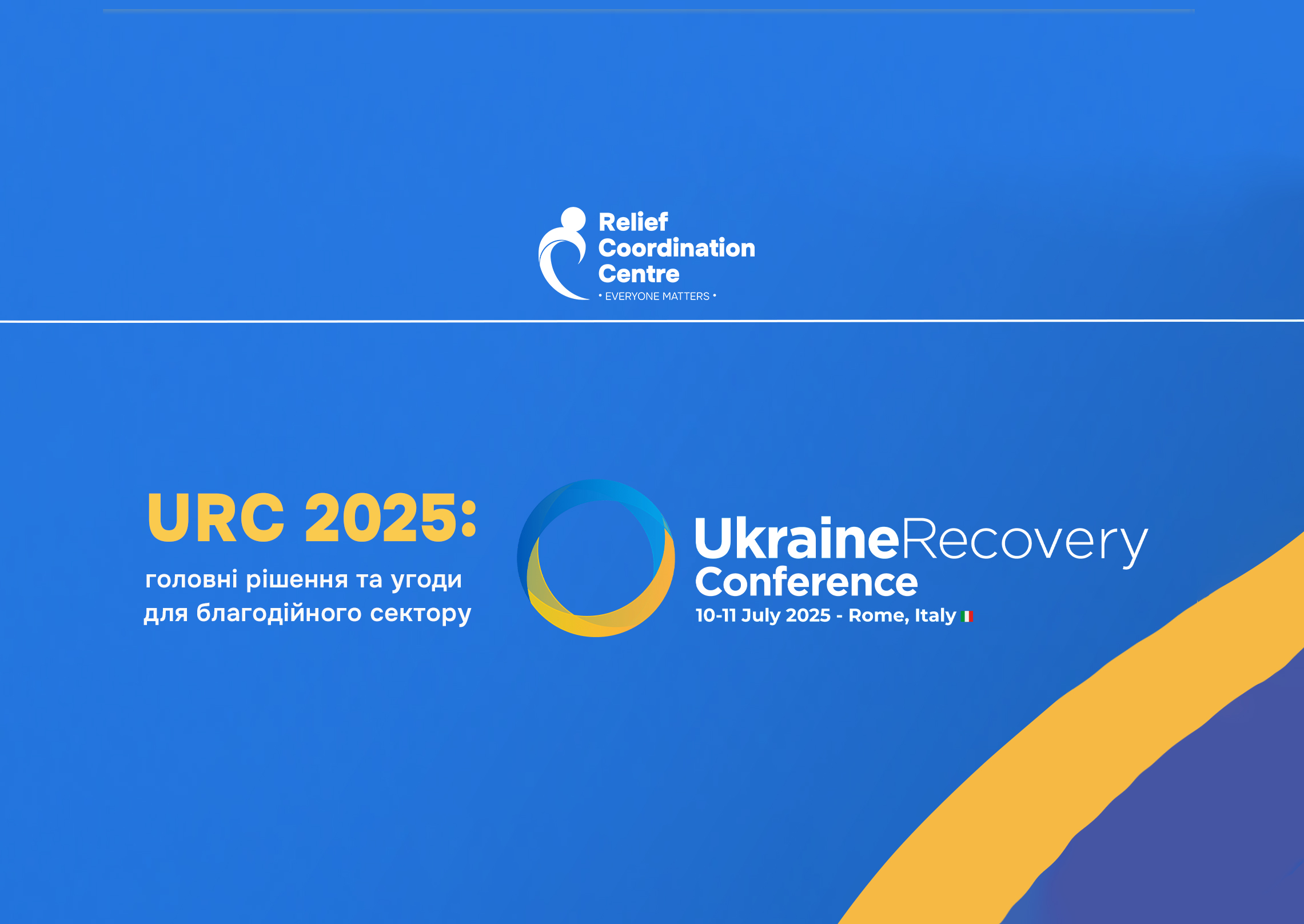Kh
RCC news

The Ministry of Social Policy, Family and Unity of Ukraine together with the Charitable Organization Relief Coordination Centre (RCC), have signed a Memorandum of Cooperation. The key goal is to develop a partnership and use the analytical data from the RCC to coordinate evacuation processes in eastern Ukraine. The collaboration will include: Providing the Ministry with up-to-date information on the dynamics of evacuation at Transit Centers. Using analytical data to make timely management decisions. Strengthening coordination between government structures and humanitarian organizations. The response from the state and the charitable sector to the biggest challenge of the war: mass evacuations Today, Ukraine is facing one of its most serious challenges, with a significant increase in evacuation dynamics in the East. Every day, thousands of people are forced to leave their homes due to military actions and danger. The greatest pain and concern for these people is uncertainty, as they don’t know where they will be able to stay, who will support them in the first days, and whether they will be left alone with their vulnerability. This partnership should become a new stage in the development of a systematic approach to supporting people forced to leave their homes, as well as a milestone for the entire charitable sector in Ukraine. Yevhen Koliada, who chairs the Relief Coordination Centre, explained the organization’s main goal, stating: Our main mission is to help those who are forced to evacuate. And our main task is to help the state and the international humanitarian community make the evacuation process fast, safe, and dignified. We want every person who has been forced to leave their home to receive not only a sense of support but also confidence in tomorrow. This is why we are also developing digital solutions that have already proven their effectiveness and help to improve the coordination of evacuation missions, bringing together the efforts of the state, the humanitarian sector, and international partners. Reference: The Charitable Organization Relief Coordination Centre The organization focuses on coordinating and harmonizing the actions of humanitarian missions and organizations in Ukraine. The RCC team, in partnership with Renome Smart, is developing unique digital tools for the charitable sector. The organization's main resource is up-to-date analytical information that helps daily: Distribute donor resources effectively. Avoid duplication of aid. Ensure a timely response to people's needs. Through this work, the RCC is establishing new standards of coordination in Ukraine's charitable sector, increasing the transparency, responsiveness, and effectiveness of humanitarian support.
The Ministry of Social Policy, Family and Unity of Ukraine together with the Charitable Organization Relief Coordination Centre (RCC), have signed a Memorandum of Cooperation. The key goal is to develop a partnership and use the analytical data from the RCC to coordinate evacuation processes in eastern Ukraine.
The collaboration will include:
Providing the Ministry with up-to-date information on the dynamics of evacuation at Transit Centers.
Using analytical data to make timely management decisions.
Strengthening coordination between government structures and humanitarian organizations.
The response from the state and the charitable sector to the biggest challenge of the war: mass evacuations
Today, Ukraine is facing one of its most serious challenges, with a significant increase in evacuation dynamics in the East. Every day, thousands of people are forced to leave their homes due to military actions and danger. The greatest pain and concern for these people is uncertainty, as they don’t know where they will be able to stay, who will support them in the first days, and whether they will be left alone with their vulnerability. This partnership should become a new stage in the development of a systematic approach to supporting people forced to leave their homes, as well as a milestone for the entire charitable sector in Ukraine.
Yevhen Koliada, who chairs the Relief Coordination Centre, explained the organization’s main goal, stating:
Our main mission is to help those who are forced to evacuate. And our main task is to help the state and the international humanitarian community make the evacuation process fast, safe, and dignified. We want every person who has been forced to leave their home to receive not only a sense of support but also confidence in tomorrow. This is why we are also developing digital solutions that have already proven their effectiveness and help to improve the coordination of evacuation missions, bringing together the efforts of the state, the humanitarian sector, and international partners.
Reference: The Charitable Organization Relief Coordination Centre
The organization focuses on coordinating and harmonizing the actions of humanitarian missions and organizations in Ukraine. The RCC team, in partnership with Renome Smart, is developing unique digital tools for the charitable sector. The organization's main resource is up-to-date analytical information that helps daily:
Distribute donor resources effectively.
Avoid duplication of aid.
Ensure a timely response to people's needs.
Through this work, the RCC is establishing new standards of coordination in Ukraine's charitable sector, increasing the transparency, responsiveness, and effectiveness of humanitarian support.

Updated Transit Centers Dashboard: New Locations and Enhanced Opportunities for Coordination
The Charity Organization Relief Coordination Centre has presented an updated version of the Transit Centers Dashboard, which now includes two new locations: Lozova and Voloske.
This tool was developed to provide humanitarian organizations and international partners with comprehensive and up-to-date information on the needs and pace of evacuation. The dashboard enables users to:
analyze the dynamics of population displacement from frontline areas;
make faster decisions and allocate resources more efficiently;
ensure transparent coordination among all involved organizations.
The updated analytics support better planning of humanitarian assistance and allow for a rapid response to emerging challenges, making the aid process more systematic and effective.
Official: Independent Relief Coordination Centre - Switzerland Association Registered
In July 2025, Relief Coordination Centre – Switzerland, an independent association, was officially registered in Zurich.
What are the strategic objectives of RCC–Switzerland?
The purpose of establishing RCC–Switzerland is to strengthen interaction with international partners, attract and mobilize additional financial, technical, and expert resources, and expand and integrate Ukrainian humanitarian expertise into global international communities. The Association will focus on supporting key areas of humanitarian activity in Ukraine:
Evacuation of civilians from dangerous regions of Ukraine.
Multi-sectoral support for the population after missile attacks.
Assistance to communities in meeting basic needs.
Psychological support for the affected population.
Implementation of protection and education programs for children affected by the war.
Psychosocial support and rehabilitation for veterans and volunteers.
Community recovery and development.
Humanitarian demining.
What will be of primary importance for the Organization?
The main focus of the Association's activities will be on forming sustainable partnerships with international and local structures, as well as private businesses. RCC–Switzerland will also work to raise the international community's awareness of the humanitarian situation in Ukraine and the current needs of the affected population. All initiatives will be implemented in close coordination with the main office of the Relief Coordination Centre in Ukraine, as well as in cooperation with the Organization's Board and Supervisory Board.
"We consider the creation of RCC–Switzerland a strategically important step to enhance the effectiveness of the humanitarian response and to form long-term solutions aimed at developing Ukraine's charitable sector. This, in turn, will contribute to the country's sustainable recovery. We express our sincere gratitude to all partners, experts, and colleagues who contributed to the creation of this initiative. The Association will work on an ongoing basis to strengthen the capacity of Ukrainian humanitarian organizations and develop international cooperation," said Yevhen Koliada, Chairman of the Board of the CO Relief Coordination Centre.

URC 2025: Key Decisions and Agreements for Ukraine's Sustainable Recovery
The Ukraine Recovery Conference (URC 2025) took place in Rome, bringing together representatives of governments and international organizations. The CO Relief Coordination Centre was represented at the conference by its Chairman of the Board, Yevhen Koliada. The event aimed to harmonize approaches and coordinate efforts within Ukraine's large-scale recovery plan. During the conference, a series of strategic decisions were adopted and important agreements were signed, laying the foundation for Ukraine's sustainable development and effective state reconstruction.
During the conference, representatives of government, business, and charitable organizations signed over 200 agreements, including memorandums and declarations. The total sum of agreements signed within URC 2025 exceeds €11 billion. The attracted investments will be directed towards restoring energy, social infrastructure, education, and the defense and social sectors. Furthermore, during the conference, 20 partnerships were established between Ukrainian communities and cities/regions from abroad, opening new opportunities for inter-regional cooperation and local recovery.
Humanitarian Sector: New Challenges and Scale of Actions
Ukraine's recovery is a multi-level process that requires close interaction among the charitable sector, the state, international partners, and the business community. UN representative Matthias Schmale emphasized during a discussion panel that Ukraine's recovery should primarily focus on restoring hospitals, educational institutions, social infrastructure, and energy, and most importantly, on ensuring a dignified life for communities most affected by Russian military aggression. Even today, we must think about a time when most Ukrainians will return to their native towns and villages, which will require reconstruction and development.
That is why quality analytics has become not just a tool for obtaining data, but the basis for effective, sustainable recovery. Already, it helps us accurately identify the needs of local communities, correctly prioritize them, avoid duplication of efforts, and strengthen trust in government decisions and international partners. After all, transparency is impossible without reliable analytical data, and without transparency, there is no trust.
Please note! You can read more details about the results of URC 2025 and find out why analytical tools have become the main instrument of sustainable recovery in the article for Mind.ua.
Key Conclusion
The results of the Ukraine Recovery Conference 2025 in Rome clearly demonstrate: the world is already ready to invest in Ukraine's future and help. The signed agreements and strategic decisions open the way for new investments, infrastructure modernization, and sustainable recovery. All this forms a strong foundation for Ukraine's long-term development and economic growth.
Data and Analysis for International Humanitarian Response
The Charitable Organization “Relief Coordination Centre” systematically publishes reports on ReliefWeb — the leading humanitarian information platform managed by the United Nations Office for the Coordination of Humanitarian Affairs (OCHA). ReliefWeb enables humanitarian organizations to transparently share their activities, statistical reporting, situational assessments, and analytical insights.
As of today, RCC has published 12 reports on the platform.
We actively collaborate with a wide range of local and international partners. Our team systematically collects, verifies, and analyzes data related to humanitarian needs of affected populations, the condition of community infrastructure, access to basic services, and ongoing or planned humanitarian interventions in Kharkiv and Zaporizhzhia regions. Based on this information, we develop comprehensive analytical products that form the basis for our reporting.
Our publications on ReliefWeb also serve an advocacy function — raising awareness of urgent humanitarian issues at the international level and highlighting the critical role of local organizations in crisis response. The reports include verified data, case studies, and practical recommendations, offering valuable insights for donors, humanitarian actors, and other stakeholders.